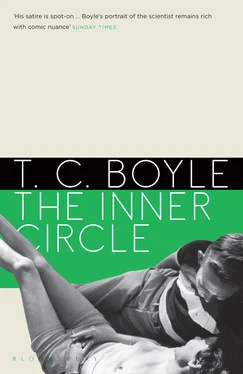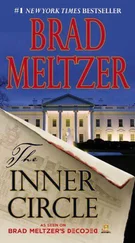Prok took a moment to remove his spectacles and polish them on his handkerchief, the file tucked under one arm. He let out a sigh. “There’s give and take in every marriage,” he said, replacing the spectacles on the bridge of his nose and neatly folding up the handkerchief, square by square, “but my advice is to reclaim your rightful place in the marital bed. I’m not going to tell you to rush into anything, but a child might be just what you need at this juncture, as a maturing factor. I’ve been more than pleased with your work, you know that, but there’s always room for improvement and I can’t help but think that fatherhood — the direct experience of it, reproduction, John, your genes passed on to another generation — will make you an even more sympathetic interviewer, in the long run, that is. Don’t you agree?”
All the way home, I rehearsed a little speech for Iris. I was going to tell her what Prok had said — that he’d all but given his blessing — but not right off. My mind was far from made up, and the first thing I expected from her was an apology. I worked as hard as anyone on this earth and whether she wanted to admit it or not the trip had put a real strain on me and she had no right whatever to deliver an ultimatum like that. Parenthood was a shared decision, something both spouses had to agree on, without resort to threats or blackmail. She didn’t really want to bring a child into the world under a cloud of resentment, did she? Would that be good for the kid? Would that be healthy? No, we would just have to wait — think things over, talk it out — until we were both ready.
There was music playing when I came in the door, something muted and tender that put me in mind of the dances we used to go to, the sort of number the band played at the very end of the last set when they brought the tempo down and the couples just stood there and swayed in place. The table was set for dinner — with flowers in a vase and cloth napkins — and on the end table beside the couch a tall bourbon and water stood perspiring on a coaster. I glanced through the bead curtains to the kitchen and saw a pot on the stove and beside it a frying pan with the pink firm slab of a beefsteak stretched across it, and that was something, beefsteak in those days, really something. I just stood there a moment, taking it all in. This is more like it, I was thinking, and I went for the drink, lifted it to my lips and let the alcohol take away the heat of the day and the last lingering vestiges of my hangover from the night before. But where was she? In the bedroom, no doubt, fussing with her lipstick, dressing to please me, to make it up to me — she was wrong and she knew it. I could forget the speeches.
It was then that I noticed that the curtains were drawn. The day had been clear and therapeutically hot, the diligent Indiana sun burning off the residuum of the previous night’s storm and saturating the air with humidity till the least movement made you break out in a sweat, and she should have had the curtains open, if only for a little circulation. I was puzzled. And sweating already, just from the effort of lifting the glass from the table. I called out her name: “Iris? Iris, I’m home!”
Her voice came from the back room—“Give me a minute”—and I took another long pull at the drink, set the glass down on the coaster and went to the window to let some air in. Just as I was reaching for the curtains, I became aware of the sudden swish and click of wooden beads behind me and Iris saying, “Don’t.”
I turned around and there she was, standing just my side of the dark undulating wave of suspended beads, the room half-lit, the music drifting out of the phonograph. She wasn’t wearing any clothes. Nothing at all. Her feet were spread and her hands poised on her hips. I saw that she’d made up her eyes and applied lipstick and done her nails, but all that was inconsequential before the single illuminating gesture of her nudity. Iris was private in her habits and modest about her body, nothing like the exhibitionist Violet Corcoran was, and she’d never posed nude for me before, or if she had it was only in the way of foreplay, in the permissive confines of the bed. “Leave them closed,” she murmured. “I don’t want any of the neighbors to see.”
I came to her as if I were on a leash and she allowed me one kiss, my hands on her breasts, her abdomen, the familiar territory, before she pushed me away. “But John,” she said, and this was the very definition of coyness, “what are you doing? You know we can’t have relations — aren’t you afraid I’ll get pregnant? Wouldn’t that be a tragedy? Wouldn’t it? Hmm?”
She was at the stove now, her back to me, lighting the gas under the pan, the beads rattling, the cat nowhere to be seen. I could taste the bourbon in the crook of my throat. The room was hotter than any sauna. And can I tell you that I took her right there on the kitchen floor, without a thought for Mac or Violet Corcoran or any other woman in the world, and that the condoms stayed right where they were, in the back corner of the cheap peeling laminated drawer of the nightstand in the bedroom?
I’d like to report that John Jr. was conceived that night, but it wasn’t to be. Months went by, then the year, the war ended, Prok, Corcoran and I were traveling at an accelerated pace and collecting histories more assiduously than ever, and despite our best efforts — Iris’s and mine — her menses came as regularly as before. We consulted the literature, employed the recommended coital positions and dutifully coupled during the most fertile period of the monthly cycle, but all for naught. Iris took hot baths, cold baths, rubbed herself with oleomargarine, consumed nothing but eggs for an entire month. Nothing seemed to work. I talked it over with Prok, who sent me to a specialist he knew in Indianapolis. I had a thoroughgoing physical, and the doctor even invited me into the back room to study my semen under the microscope in order to reassure me that there was nothing amiss. Prok and I began to suspect Iris, and she was examined too — by a gynecologist Prok recommended, the very man who’d helped Mac with her adhesion problem twenty years earlier — and he pronounced her both normal and fit. So what was the problem? What were we doing wrong? Neither of us had a clue, but Prok did, and he was typically blunt about it.
After reviewing the results — we were in the office and he’d been pacing back and forth in front of his desk with a puzzled frown, murmuring to himself — he motioned me to him. It might have been raining that day, I don’t remember, but rain would have been appropriate — as a symbol of hope and fertility. I needed something positive, because I’d been down on myself, feeling inadequate, impotent, a failure even at this. We stood together at the window a moment, gazing out on the campus. “You just have to account for the aleatory factor here, that’s all,” he said finally.
“I’m sorry?”
“Each of the millions of your spermatozoa fighting for purchase in the uterus and Fallopian tubes, an ovum descended or not, as the case may be, natural selection at work, that is, in the microcosm of one woman’s womb—”
I gave him a puzzled look.
“Chance, John, chance. Keep trying, that’s all I can say.”
In the meanwhile, our larger quest — for new blood at the Institute — had begun to turn up a number of qualified candidates now that the war was over, and we started interviewing in earnest. Each man was invited to campus, with his wife and family — the wives, in particular, had to be scrutinized, not only to determine if they were in any measure sex shy, but if they were discreet and reliable as well — and Prok gave them a tour of the facilities, arranged a picnic or musicale in their honor, took their histories and had Corcoran and me vet them for any irregularities. (Typically, Prok would have us take the candidate out on the town afterward, sans wife, in order to loosen him up and catch him off guard, and if that required a certain outpouring of liquor and a given number of Havana cigars drawn on the Institute coffers, it was nothing more than a practical business expenditure by Prok’s accounting.) Obviously, nearly all the candidates had one flaw or another, and Prok, perfectionist that he was, rejected them wholesale despite his almost desperate need for another man.
Читать дальше












